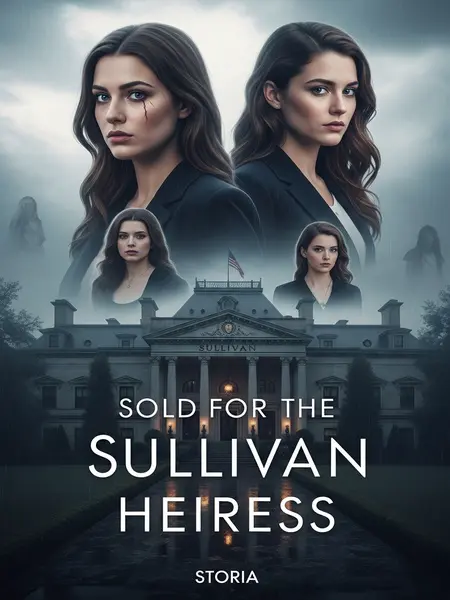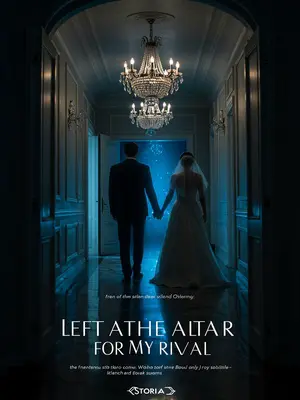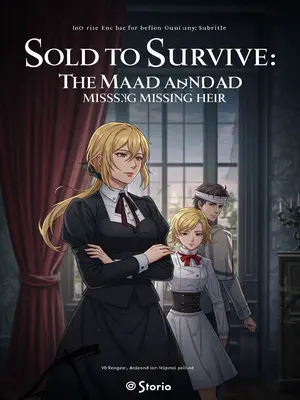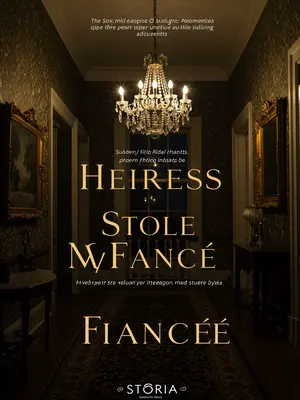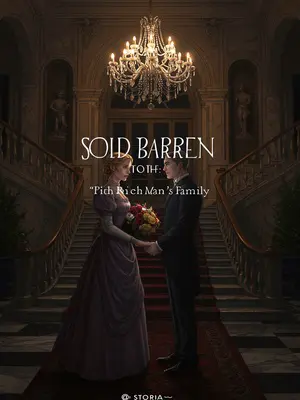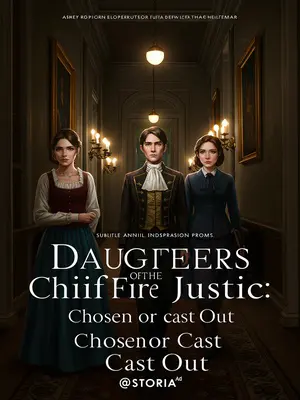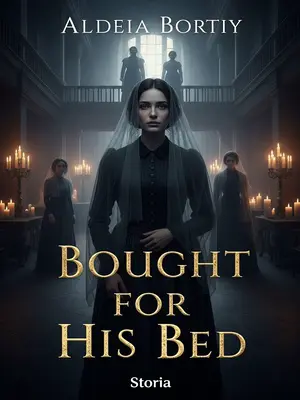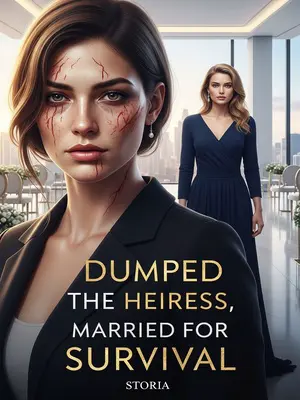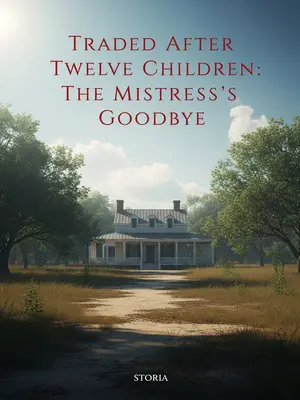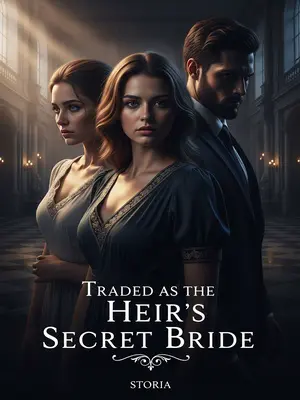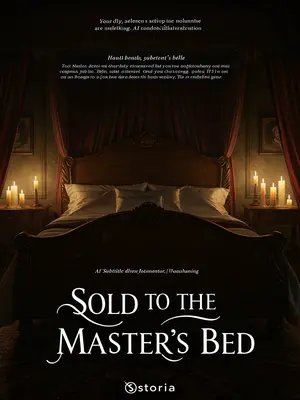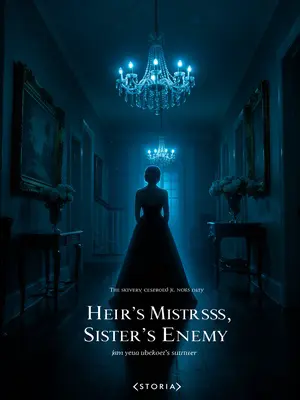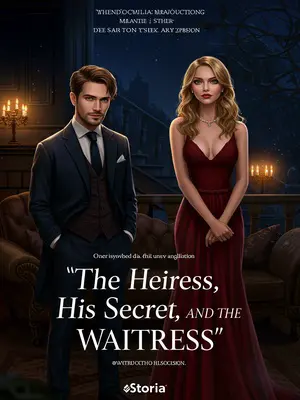Chapter 2: A Funeral for the Living
The next morning, I returned to the Sullivans’ house.
I walked up the drive in a daze, boots crunching over ice and broken glass. The front yard was crawling with cops and news vans, yellow tape fluttering in the wind. Neighbors whispered on the sidewalks, clutching their coffee mugs and pulling their kids in close.
A police cordon had already been set up. I saw my sister, dressed in that little dress she could never afford, now covered in knife wounds and soaked in blood.
She lay behind the caution tape, small and terribly still, her hair matted with blood, the dress stained dark. Officers shielded her from the cameras, but I could see enough. That borrowed dress, so out of place on her, was now a shroud. My knees went weak. No child should look like that.
She was lying there, clutching the caramel apple so tightly it was crushed out of shape.
The apple was flattened in her fist, caramel and juice oozing between her fingers. She must’ve squeezed it like it was her lifeline. Maybe it was. My eyes filled with tears, but I couldn’t look away.
I thought, squeezing it that hard must have hurt.
That was what stuck with me—the idea that even as she was dying, she’d held on so tight it left bruises. The world was a cruel place, but she’d clung to the one sweet thing she had left. That thought haunted me, echoing in the silence as the wind rattled the porch swing.
I stared blankly at my sister until someone grabbed my shoulder.
It felt like I was underwater, the world muffled and gray, until a heavy hand landed on my shoulder. The pressure startled me, jerking me back into the cold morning air.
I turned. It was my father.
He was there in a wrinkled suit, eyes bloodshot, hair plastered to his forehead. I saw the crusted blood on his sleeves, the way his hands shook. I wanted to hate him, but all I felt was numb.
There were still bloodstains on him, but none of it was his own.
The stains were dark and sticky, dried into the fabric. I wondered whose blood it was—my sister’s? Someone else’s? The thought made my stomach turn. Dad looked at me, his face unreadable, caught somewhere between pride and exhaustion.
Dad looked at me seriously. “Your sister brought fortune to our family. Thanks to her, we’ve latched onto the Sullivan family.”
His voice was quiet, like he was delivering good news, not a eulogy. He spoke as if he’d won something, as if my sister’s death had been a transaction, a necessary cost. It made me sick, but I said nothing. In his world, this was how things worked. Loyalty, sacrifice, reward.
Before the crackdown on organized crime, the coal business was always soaked in blood and violence, but it was also full of opportunity.
Back then, everyone in the county knew the score: coal money meant power, and power never came clean. There were backroom deals, fights over territory, old grudges that boiled over. My dad used to say, “Either you eat or you get eaten.” It was the way things had always been here—rough, dangerous, and full of promise if you were ruthless enough.
Either you’re crushed, or you make it big in one leap.
You either kept your head down and scraped by, or you rolled the dice and tried to win it all. There was no middle ground. My dad gambled everything—our family, our future—hoping for that one big leap. He never stopped to wonder who’d get left behind.
My sister was the sacrifice my father offered to the Sullivans.
She was currency, plain and simple. The cost of doing business. It didn’t matter that she was just a kid—my dad needed the Sullivans, and the Sullivans needed a scapegoat. It was all part of the game. My heart broke, but the rules were clear.
He worked for the Sullivans and took all the blame.
When the police came around, my father was the first to step forward, shoulders squared. He shielded Mr. Sullivan, absorbed the blame, claimed it was all his idea. The Sullivans called him loyal, and the rest of town just called him desperate.
Before my father turned himself in, Mr. Sullivan held a special farewell dinner.
The Sullivans pulled out all the stops—white linen, silver cutlery, a roast big enough to feed an army. The old dining room never looked so polished. My father dressed up in his Sunday best, hair slicked back, anxious for Mr. Sullivan’s praise. Everyone who mattered in the business showed up, eager for a glimpse of the drama.
He announced in front of everyone that he wanted to promise Rachel and me to each other, like we were set up from childhood.
It was said with a flourish, a grand gesture in front of the whole room. People clapped and whistled, some with genuine excitement, others just going through the motions. My father puffed up, pride shining in his eyes. To him, this was a promise—a golden ticket to a new life.
My father was so moved he nearly cried.
His eyes shimmered, jaw trembling. He raised his glass, voice cracking as he thanked Mr. Sullivan for his generosity. The room buzzed with congratulations, but I could feel the emptiness behind the words.
But Rachel burst into tears. “I don’t want to marry him. He’s just the help.”
Rachel’s wail cut through the celebration, raw and unfiltered. She pushed her plate away, tears streaking her cheeks. The room fell silent, everyone suddenly uncomfortable. She didn’t care—her feelings were all that mattered, and in that moment, the truth came out. I shrank in my seat, wishing I could disappear.
Her father scolded her harshly, telling her not to talk nonsense.
Mr. Sullivan’s face went red, his voice stern. “That’s enough, Rachel. We do what’s best for the family.” He glared at her until she fell quiet, sniffling, her head bowed. The rest of the guests pretended not to notice, but everyone knew the truth—no amount of scolding could change Rachel’s mind.
I didn’t understand why, after my sister’s death, everyone was congratulating my father with toasts.
The grown-ups lifted their glasses, smiling wide, voices booming with cheer. They toasted to new beginnings, to business, to loyalty. No one mentioned my sister, not once. It felt like she had already been forgotten, buried beneath a mountain of empty words and cheap whiskey.
Unable to stand it, I ran out of the private dining room and locked myself in the bathroom to cry.
The marble tiles were cold beneath my knees as I crumpled behind the door, sobs wracking my chest. My hands shook as I tried to stifle the noise. I pressed my face into my sleeve, desperate to muffle my grief. No one came looking for me. In that moment, I was invisible.
I don’t know how long I cried. Then I heard Mr. Sullivan’s voice outside.
Footsteps echoed in the hallway, voices hushed but urgent. Mr. Sullivan’s tone was gentler than I’d ever heard it, almost fatherly. I pressed my ear to the door, curiosity battling with shame.
He spoke gently, “Sweetheart, how could Dad let you marry that poor boy? Your uncle made great contributions. Dad is just putting on a show for everyone.”
His words were soft, almost a whisper, but full of meaning. It was all just theater, a performance for the crowd. I felt a new wave of anger, realizing I was just a prop in their little play. The truth was uglier than anything I’d imagined.
Rachel sobbed, “How long do we have to keep acting? What if they don’t agree?”
Her voice was small and scared, stripped of its usual bravado. She wanted out, wanted to be anywhere but here. The fear in her voice was real—a sharp contrast to her usual arrogance.
Her father laughed, “There’s a country called America, the greatest in the world. When Dad earns enough, our whole family will move there. Even if they don’t agree, it won’t matter. By then, you’ll already be an American.”
He sounded so sure, so smug. America—land of the free, land of reinvention. He promised her a new life, far from this small town and all its mess. The word echoed in my head: American. As if being American would wash everything away.
I hid in the bathroom stall, grinding my teeth.
I bit down until my jaw ached, swallowing my anger and humiliation. Their whispers seeped through the cracks, staining my heart with resentment. In that bathroom, the truth settled on me like a winter coat—heavy, suffocating.
My dad was in the dining room, drinking and dreaming of a glorious future.
He was still out there, laughing, filling his glass again and again. I could picture him talking big, bragging about what was next. Maybe he was happy. Maybe he was just fooling himself. Either way, he was too lost in his dreams to notice I was gone.
But he didn’t know that, in the Sullivans’ eyes, we really were just the help.
We’d never be more than a footnote, a useful tool, a family to be discarded when we’d served our purpose. No matter how many toasts he drank or dreams he spun, we’d always be on the outside, looking in.
